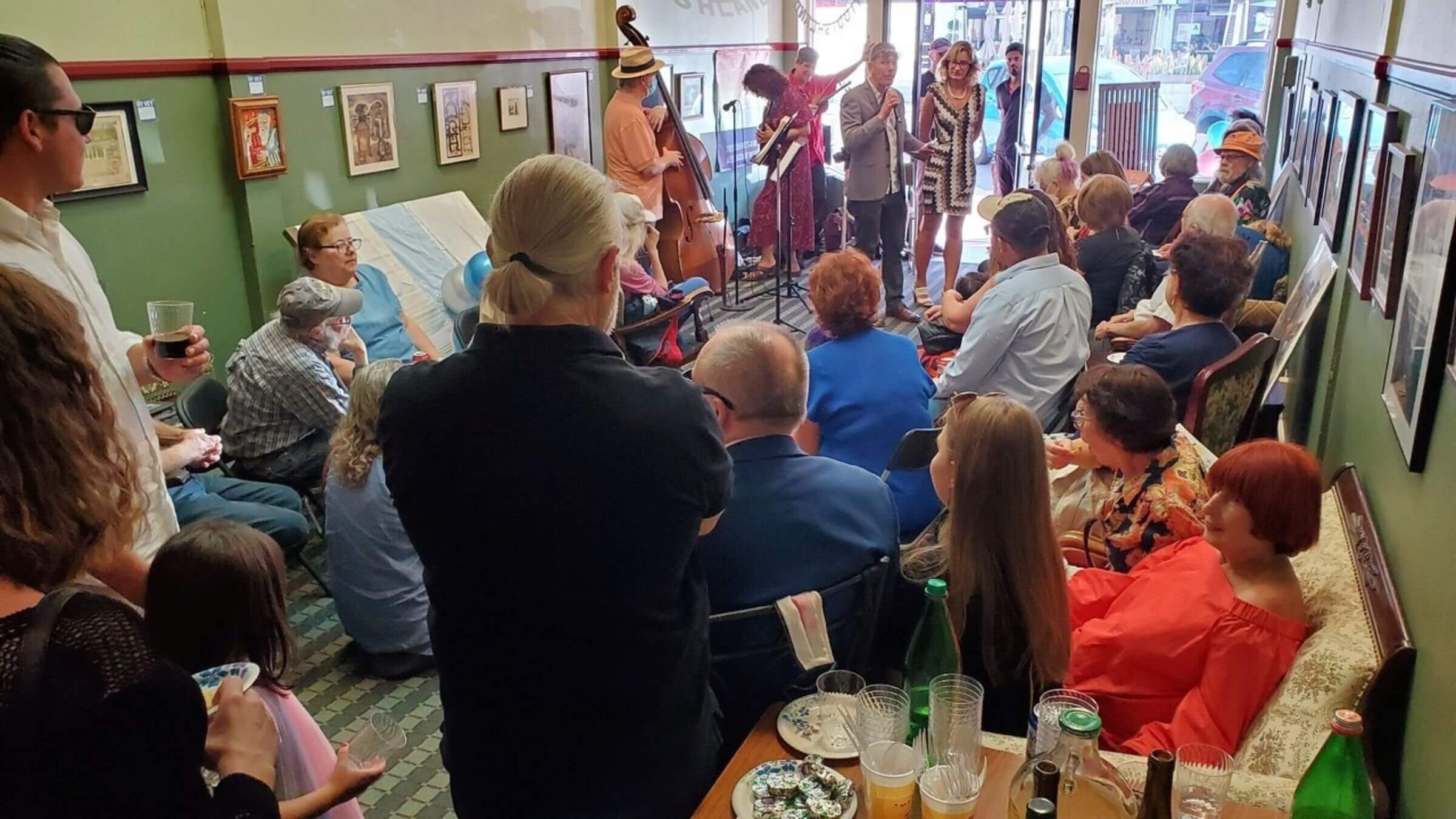The brave Yiddish startup
I wanted to know what motivated people to dedicate their lives to spreading Yiddish, and to share their stories.

Yiddishland California in La Jolla’s grand opening in 2021. Courtesy of YAAANA
When I had the privilege to start working full-time at the Forverts a few months ago, I was eager to start writing about Yiddish startup projects because of my personal history; I’m an ordained rabbi and co-founder of a Yiddish cultural center and synagogue hybrid in Los Angeles called Der Nister, named after the great Yiddish writer. I know firsthand that trying to build something is difficult, especially when the project is related to Yiddish. I’ve heard a lot of discouragement and ridicule about my pursuit of Yiddish since I began studying it in high school.
I know I’m not the only one that discovered Yiddish two or more generations after it was spoken in their family, but it’s difficult to find others who spend time, money and serious effort on learning and spreading the language, especially since most people think of this as a novelty at best.
So who are these people launching Yiddish projects?
My first deep dive in Yiddish startups came with Queer Yiddish Camp. I learned that freygl gertsovski (whose name is written without capital letters) had been building an online community of queer Yiddishists for years and recruited faculty to this new Yiddish summer program. Yiddish has been a home for queer Jews for decades, who turn to it as an expression of their Jewish identity, seeing it as an “outsider” language, much as they have felt like outsiders in other Jewish communities. Many felt that traditional summer programs weren’t honoring the identities of the many students that came to them. Because of this, gertsovski believed it was possible to recruit enough students and teachers to create a comfortable online space, using a shoestring budget. Queer Yiddish Camp came to life this past May.
My second deep dive began with the new Yiddish translation publishing house, Naydus Press, and later broadened to similar projects like the Yiddish Translation Fellowship. Naydus Press has the idealistic “build it and they’ll come” mentality that I was seeking. Founder Jordan Finkin does the publishing and editing in his spare time. (His day job? Rare book librarian at Hebrew Union College Cincinnati.) Naydus Press is a labor of love and self-expression — but it comes out of a frustrating experience for Finkin. He felt that he had long been shut out of being able to work in Yiddish studies for his scholarly pursuits; through Naydus, he could prove that his interest in Yiddish and Yiddish literature had a value that academic institutions overlooked in the past.
This frustration was shared by many involved in the Yiddish Translation Fellowship who told me how hard it was to publish their work. The fellowship itself started a decade ago at the Yiddish Book Center with a dream to change the conversation on Yiddish culture in the general public by showcasing the works of modern literature that were not part of the canon for social and political reasons. The goal was to show that if certain books were translated to English and widely disseminated, they could break the staid image of a scorned language and culture. These translators also described how their interest in Yiddish wasn’t taken seriously. The ecosystem that the fellowship has built, including Naydus Press, is now making waves in the literary world and reaching the popular imagination, just as they had hoped.
For my next project, I want to go to YAAANA (Yiddish Arts and Academics Association of North America) – Yiddishland California in La Jolla. The founder, Jana Mazurkiewicz Meisarosh, is a Polish doctoral student in Yiddish at the University of Michigan, who bravely committed herself to start a Yiddish community center online and in-person. I’ve been there a number of times (full disclosure: I taught a class on the alef-beys there). I came away impressed with her dedication in creating an active Yiddish community, in the face of many obstacles, and far from cities with large Yiddish-speaking populations like New York.
It takes dedicated people running into the unknown, filled with hope, to keep Yiddish flowing and to build its popularity up further among the non-Hasidic communities. I’m struck by a commonality among all my interviewees: unending passion for something they find meaningful and beautiful, all of them engaging in heroic acts of Ahavas Yisroel, selfless love of the Jewish people.
A message from our CEO & publisher Rachel Fishman Feddersen
I hope you appreciated this article. Before you go, I’d like to ask you to please support the Forward’s award-winning, nonprofit journalism during this critical time.
At a time when other newsrooms are closing or cutting back, the Forward has removed its paywall and invested additional resources to report on the ground from Israel and around the U.S. on the impact of the war, rising antisemitism and polarized discourse.
Readers like you make it all possible. Support our work by becoming a Forward Member and connect with our journalism and your community.
— Rachel Fishman Feddersen, Publisher and CEO